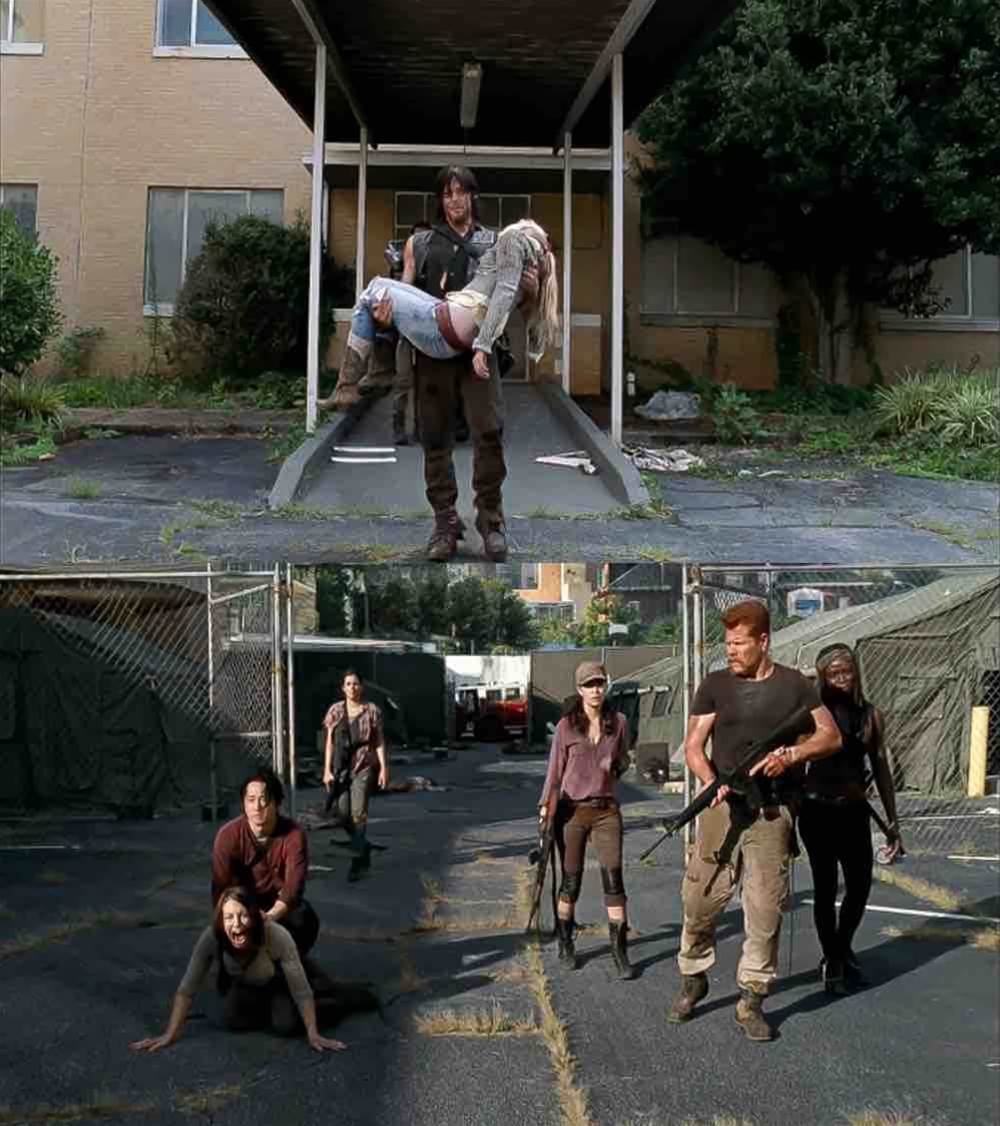From Hope to Heartbreak: Why *The Walking Dead*’s “Coda” Mid-Season Finale Disappointed and Divided Fans
On November 30, 2014, *The Walking Dead* aired “Coda,” the mid-season finale of its fifth season, promising a dramatic resolution to the Grady Memorial Hospital arc. Fans were eager to see Beth Greene (Emily Kinney), a character who had evolved from a quiet optimist to a fierce survivor, reunited with her family. Instead, the episode delivered a gut-punch: Beth’s abrupt and controversial death in a botched hostage exchange, leaving viewers stunned and, for many, deeply dissatisfied. Cited as one of the show’s most disappointing episodes, “Coda” sparked outrage over its narrative choices, pacing, and handling of Beth’s arc. This article dives into why “Coda” fell short, drawing on fan reactions, critical analyses, and behind-the-scenes context to unpack its failures and enduring impact on *The Walking Dead*’s legacy.

The Context: High Hopes for Season 5
Season 5 of *The Walking Dead* was a creative high point, following the group’s escape from Terminus and their struggle to retain humanity in a walker-infested world. The hospital arc introduced a fresh setting: Atlanta’s Grady Memorial Hospital, where Beth was held captive by Dawn Lerner (Christine Woods) and her corrupt police force. Episodes like “Slabtown” showcased Beth’s growth, as she navigated Dawn’s authoritarian regime alongside Noah (Tyler James Williams). Her resilience won over skeptics, with fans on Reddit praising her as “finally a compelling character.” Meanwhile, Rick Grimes (Andrew Lincoln) led a rescue mission, culminating in a tense plan to exchange hostages for Beth and Carol Peletier (Melissa McBride), who was recovering from injuries.
“Coda” opened with a jolt: Rick ran down and killed Bob Lamson (Maximiliano Hernandez), a fleeing hospital cop, signaling his ruthless edge. Subplots involving Father Gabriel’s (Seth Gilliam) reckless walker encounter and Abraham’s (Michael Cudlitz) return with a disillusioned Eugene (Josh McDermitt) set the stage for a climactic showdown. With 14.81 million viewers tuning in, expectations were sky-high for a payoff worthy of the season’s momentum. Instead, “Coda” stumbled, undermining its potential with a poorly executed twist.
The Fatal Flaw: Beth’s Illogical Death
The episode’s defining moment came during the hostage exchange in the hospital’s hallway. As Rick’s group swapped captives with Dawn’s, the deal seemed set—until Dawn demanded Noah stay, claiming control over him. Beth, fueled by defiance, stabbed Dawn in the shoulder with scissors she’d hidden. Dawn’s reflexive gunshot killed Beth instantly, prompting Daryl Dixon (Norman Reedus) to shoot Dawn in retaliation. The scene ended with a haunting image: Daryl carrying Beth’s lifeless body as Maggie Greene (Lauren Cohan), her sister, collapsed in anguish outside.
For many, Beth’s death was a narrative misfire. Her impulsive attack on Dawn, surrounded by armed officers, contradicted the cunning she’d shown earlier, such as manipulating hospital staff to protect Noah. Critics like Matt Fowler of IGN, who rated the episode 7.5/10, called the death “a quick shock” that felt “off,” arguing it undermined Beth’s arc. Fans on X echoed this, with posts like “Beth’s death was so dumb. She was smart, not reckless.” The provided search results highlight similar sentiments on Reddit, where users called it “forced” and “a cheap way to create drama.” The decision to kill Beth, a character who symbolized hope through her singing and optimism, felt like a betrayal of her development, especially after her expanded role in Season 5.
Narrative and Pacing Problems
“Coda”’s issues extended beyond Beth’s death. The episode’s pacing was uneven, with significant time spent on secondary plots—like Gabriel’s church misadventure—that diluted the focus on the hospital. Carol, a fan-favorite, was sidelined, waking up off-screen and barely contributing, which Den of Geek noted as a “missed opportunity.” The hospital arc itself, initially intriguing for its moral ambiguity, fizzled out. Dawn’s complexity as a flawed leader was underexplored, and her death resolved the conflict too neatly, leaving the hospital’s systemic issues unaddressed.
Another sore point was Maggie’s characterization. Despite being Beth’s sister, Maggie hadn’t mentioned her since early Season 4, making her grief in “Coda” feel unearned. Forbes criticized this disconnect, noting that Maggie’s sudden emotional collapse “rang false” given her prior indifference. The episode’s structure also suffered from a lack of escalation. Unlike iconic *Walking Dead* finales, such as the Terminus slaughter, “Coda” lacked a broader action sequence or deeper thematic resonance, ending on a note of despair rather than tension or hope.
Fan Outrage and Critical Reception
The backlash to “Coda” was swift and vocal. On *Talking Dead*, Emily Kinney’s tearful appearance underscored the emotional toll of her exit, with host Chris Hardwick struggling to pivot to lighter topics. Robert Kirkman, an executive producer, defended the death, arguing it would drive Daryl and Maggie’s arcs, but fans weren’t convinced. Reddit threads from the search results reveal deep frustration, with one user stating, “It felt like they killed her just to make us cry, not to tell a story.” AMC’s decision to post a spoiler image of Beth’s body on Facebook before the West Coast airing further inflamed fans, prompting apologies from the network.
Critical reviews were mixed. The A.V. Club’s Zack Handlen praised the cast’s performances but called the death “a waste,” while Entertainment Weekly noted the episode’s “emotional gut-punch” but questioned its logic. Some outlets, like WhatCulture, appreciated the shock value, but the consensus leaned toward disappointment, with “Coda” often ranked among the show’s weakest episodes in later retrospectives. Viewership data showed resilience—7.6 in the 18-49 demographic—but the episode’s legacy was tainted by its divisive reception. Fans on X continued to debate years later, with sentiments like “Still mad about Beth” reflecting the wound’s longevity.
Behind-the-Scenes Decisions
Directed by Ernest Dickerson and written by Angela Kang, “Coda” aimed to close the hospital arc while setting up the group’s next journey to Alexandria. In interviews, showrunner Scott Gimple explained that Beth’s death was meant to highlight the cost of defiance, but he admitted to Entertainment Weekly that the execution “polarized” viewers. Kang, who later became showrunner, intended Beth’s act to be heroic, but the scissors plot device felt forced to many. Budget constraints may have played a role; producer Greg Nicotero revealed plans for a massive walker sequence were scrapped, which could have balanced the episode’s quiet climax.
Kinney learned of her exit late in production, a common practice for *The Walking Dead* to maintain secrecy. Her departure was a creative gamble, as Beth’s fanbase had grown significantly. Kirkman later reflected on Reddit AMAs that killing beloved characters was “necessary” for stakes but acknowledged the risk of alienating viewers. The decision to prioritize shock over coherence echoed broader criticisms of Season 5’s rapid character deaths, including Bob and Tyrese, which some felt desensitized audiences.
The Lasting Impact of “Coda”
“Coda” left a complex legacy. Beth’s death shaped Daryl’s arc, deepening his guarded nature, and Maggie’s grief, though underexplored, added layers to her leadership in later seasons. The episode’s failure to capitalize on the hospital’s potential foreshadowed fan fatigue with *The Walking Dead*’s formula of loss and survival. It also highlighted a recurring issue: the show’s tendency to sacrifice character arcs for emotional beats, a critique that resurfaced with later deaths like Carl’s.
Yet, “Coda” wasn’t without merits. The performances, particularly Kinney’s nuanced portrayal and Reedus’s raw grief, were universally praised. Rick’s opening scene showcased Season 5’s gritty tone, and the Morgan post-credits tease laid groundwork for future arcs. For some fans, the episode’s raw emotion was enough, with a minority on Reddit calling it “devastating but effective.” Still, the prevailing sentiment was one of missed opportunity, with “Coda” serving as a cautionary tale of how even a strong season can falter under the weight of a single misstep.
Why “Coda” Remains a Sore Spot
“Coda” disappointed because it betrayed Beth’s arc and squandered Season 5’s narrative momentum. Her illogical death, coupled with pacing issues and an underdeveloped hospital storyline, left fans feeling robbed of a character who deserved better. While *The Walking Dead* thrived on unpredictability, “Coda” crossed a line, prioritizing shock over storytelling. Its fallout—fan outrage, critical divide, and a tarnished mid-season finale—underscores the delicate balance of maintaining stakes without alienating viewers. A decade later, “Coda” remains a polarizing chapter, a reminder of *The Walking Dead*’s power to captivate and frustrate in equal measure.





